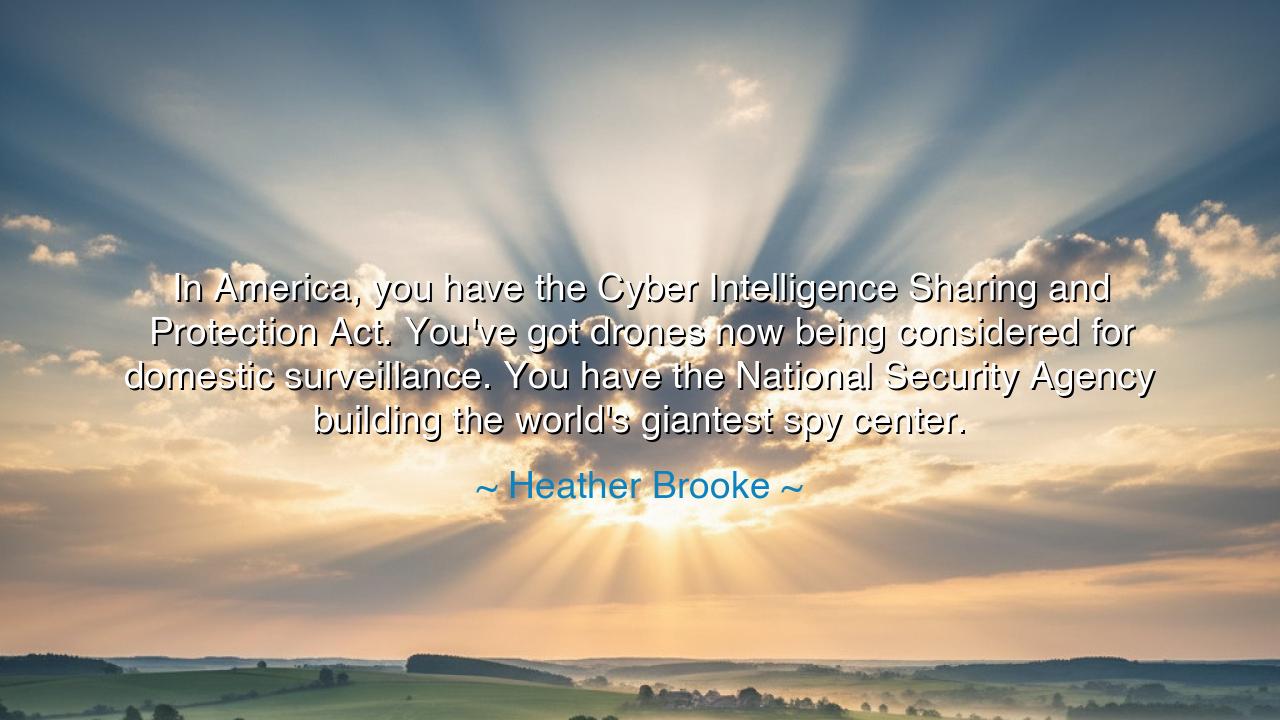
In America, you have the Cyber Intelligence Sharing and
In America, you have the Cyber Intelligence Sharing and Protection Act. You've got drones now being considered for domestic surveillance. You have the National Security Agency building the world's giantest spy center.






The words of Heather Brooke, journalist and advocate for transparency, ring like the voice of a modern Cassandra, warning the world of the shadows gathering behind the screens: “In America, you have the Cyber Intelligence Sharing and Protection Act. You’ve got drones now being considered for domestic surveillance. You have the National Security Agency building the world’s giantest spy center.” These are not idle observations, but a call to vigilance — a lament that in an age of progress, freedom may perish not by the sword, but by the soft hum of machines. Her words speak of a new empire of surveillance, where knowledge, once a weapon of liberation, has become the tool of control.
To understand the origin of this warning, we must look to the world as it stood in the early decades of the twenty-first century. Technology, that ancient servant of human will, had become a god unto itself — vast, unseen, and insatiable. Governments, fearing chaos and driven by the hunger for power, built systems that watched their citizens under the banner of safety. The Cyber Intelligence Sharing and Protection Act (CISPA), proposed in the United States, sought to open the floodgates between corporations and the state, allowing them to exchange private data in the name of “security.” Drones, once weapons of distant battlefields, were being prepared to hover over the homes of the very people they were meant to protect. And in the desert of Utah, the National Security Agency (NSA) raised a colossal fortress — a citadel of code — to collect, store, and analyze the thoughts, words, and movements of millions. Brooke saw in these things not protection, but peril — the birth of an age of watching, where privacy became an illusion and truth a prisoner.
Her words strike at the heart of a timeless paradox: that every empire which claims to guard its people eventually comes to fear them. In ancient Rome, as rebellion and corruption spread, the Senate built networks of informants to spy upon its citizens. The more it watched, the less it trusted; the more it controlled, the less it ruled. So too, in our modern world, technology has given governments an all-seeing eye, a gaze that pierces every letter, every phone call, every dream whispered through the internet. But this gaze, though clothed in righteousness, carries the same danger that felled the empires of old — for when a state learns everything about its people, the people soon learn nothing about their state. Knowledge flows upward, secrecy downward; and thus, freedom withers in silence.
Yet Brooke does not speak only to condemn — she speaks to awaken. Her warning is not despair, but defiance. She reminds us that the tools of oppression are born from the same hands that once forged the tools of enlightenment. The pen, the press, the code, the network — all these were created to connect humanity, to spread truth and unite voices across oceans. The tragedy lies not in the tools themselves, but in their use. When the internet was young, it was a dream of democracy — a web of minds joined in curiosity and creation. But as greed and fear crept in, the web became a net, woven not to share, but to capture. Brooke’s voice calls us back to the origin of that dream — to reclaim technology not as master, but as servant of liberty.
Consider the tale of Edward Snowden, the whistleblower who, in 2013, revealed the vast machinery of surveillance that Brooke had spoken of. Snowden, like a modern Prometheus, stole fire from the gods — the hidden truths of government — and gave it back to the people. His revelations ignited a global debate about privacy, trust, and power. He was hunted, exiled, and branded a traitor; yet his courage illuminated what many had chosen not to see. In him, we glimpse the spirit that Brooke’s words demand: the willingness to speak truth to power, to stand against the machinery of silence. His story is not one of rebellion alone, but of conscience — proof that one voice, when lifted in truth, can shake the pillars of an empire built on secrecy.
The lesson here is eternal: that liberty, once surrendered, is never easily reclaimed. Each generation must guard it anew, not only against tyrants with crowns, but against the quiet tyranny of convenience. The citizens who trade privacy for comfort, who accept surveillance in the name of safety, forget that safety itself is born of freedom. Brooke’s warning is thus a mirror — it reflects not only the power of the state, but the apathy of the people. She reminds us that to be free, one must remain vigilant, to question authority, to demand transparency, to keep the light of accountability burning even in the darkest halls of power.
And so, my children, let these words be your charge: do not sleep in the comfort of your devices. The world’s eyes may watch you, but your own eyes must stay open. Speak, write, resist — not with violence, but with truth. Protect your right to privacy as you would protect your right to breath, for they are one and the same. Remember that even the grandest spy center cannot imprison a free mind that dares to think. The age of information is the age of awakening — but only if you choose to awaken. Heather Brooke’s words are a call to arms for the soul: that we, the inheritors of both knowledge and power, must decide whether to be watchers or the watched, rulers or the ruled, free people or willing captives of our own creation.






AAdministratorAdministrator
Welcome, honored guests. Please leave a comment, we will respond soon